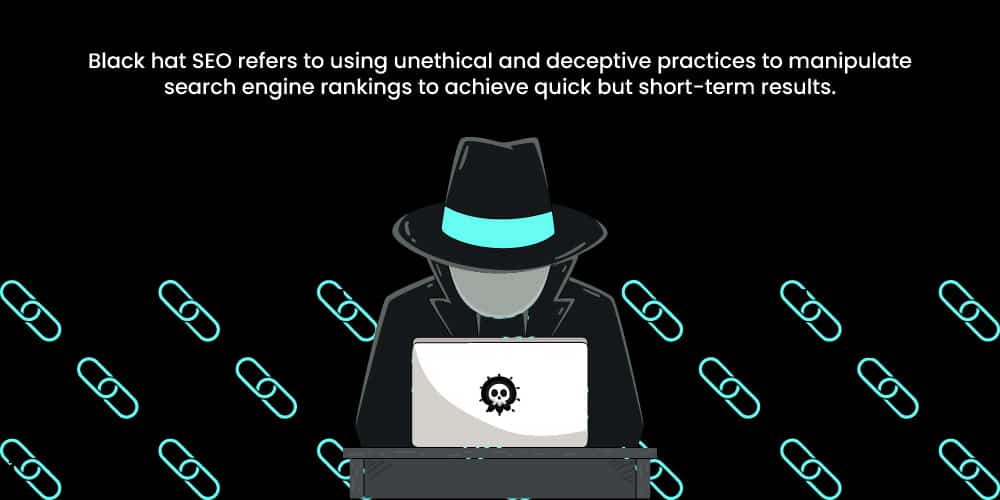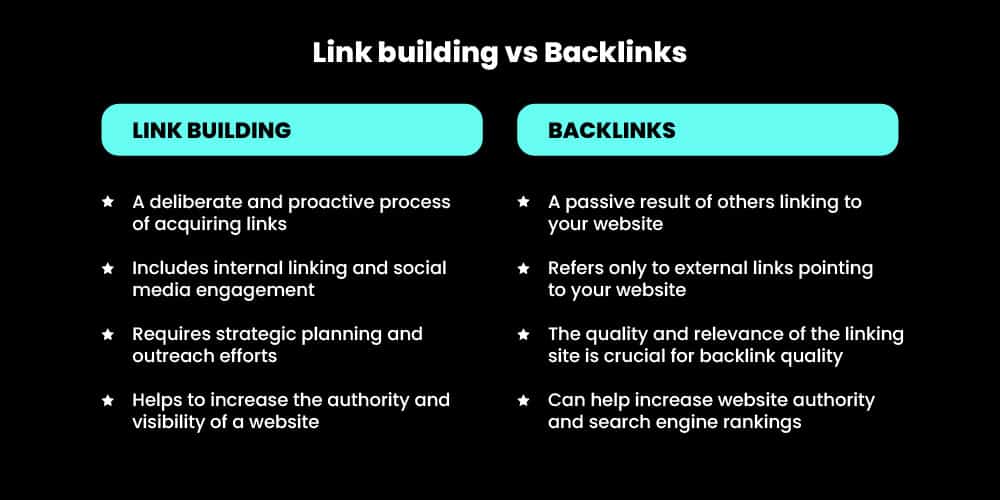7 Do’s and Don’ts of Backlink Building: Tips for Avoiding Penalties
Ever wondered what backlink building is all about? Why is it important? And what are some popular backlink building strategies to try?
This blog answers all your questions about backlink building! But first…
What is backlink building?
Backlink building involves creating hyperlinks in other websites that redirects a user to your website. It’s an important aspect of search engine optimization (SEO) because search engines like Google use backlinks to determine a website’s credibility and authority.
However, not all backlinks are created equal. When it comes to backlink building, quality is more important than quantity. And with 46% of companies expected to spend $10,000 for SEO link building alone, it is an SEO tactic not to skip.
A handful of high-quality backlinks from well-known and reputed websites can be more beneficial than many low-quality backlinks. This is because search engines prioritize backlinks from authoritative websites over those from spammy or irrelevant websites.
This blog explores the top seven do’s and don’ts you need to be careful about when building backlinks.
The 7 Do’s of Backlink Building
Tip: If you are wondering how backlink building strategies can help your business grow online, let our SEO experts help you out.
1. Building High-Quality Backlinks from Authoritative and Relevant Websites
When it comes to backlink building, high domain authority, and page relevancy are crucial factors that can significantly impact the success of your SEO efforts.
Getting links from high-domain authority websites signals search engines that your website is credible and trustworthy, resulting in improved search engine rankings.
Additionally, backlink acquisition from pages suitable to your website’s content (and niche) can help improve your website’s relevance and topical authority. This helps in attracting more targeted traffic and better user engagement. Moreover, these factors are crucial for building your backlink profile.
2. Creating Valuable Content for Natural Backlinks
Do you know 94% of content updated on the internet ends up never getting a backlink?
Creating valuable, fresh, and original content is an effective way to attract high-quality backlinks naturally. By consistently producing content enriched with value, a brand can establish its authority in the industry and attract links from other websites looking to share valuable information.
Additionally, promoting your content is crucial to attracting high-yield backlinks.
This often involves reaching out to bloggers, sharing published content on social media, and leveraging email marketing. Combining high-quality content with strategic promotion maximizes your backlink building efforts significantly and drives more website traffic.
3. Using Keyword-Rich Anchor Text Ethically
The clickable text of a hyperlink is known as anchor text. It is visible to the reader, and it’s important for SEO because it tells search engines what the linked page is about.
However, overusing exact-match keywords or repeatedly using the same anchor text is often perceived as spammy and can trigger unwanted penalties from search engines.
Instead, it is always a best practice to use natural and varied anchor text that accurately reflects the linked page’s content. Also, avoid black hat tactics like buying or exchanging links. These practices can harm a website’s reputation and ranking.
4. Building Backlinks by Engaging in Online Communities and Forums
Engaging in online forums and communities is a great way to establish authority in your niche and build relationships with like-minded individuals.
Participating in discussions and providing helpful insights to earn your audience’s trust can naturally attract backlinks to your website.
Consider including a link to your website in your forum signature or bio, but avoid spammy self-promotion. You can also reach out to other members for guest posting or content collaboration.
Strategic and well-planned networking in online communities can enhance your website’s credibility and visibility, ultimately earning valuable backlinks.
Tip: Guest posting is among the popular link-building tactic, and 64.9% of link builders use it to grow online.
5. Improving User Experience with Internal Linking
Internal linking refers to the process of linking one page of a website to another page within the same website. It helps users navigate through the website and find relevant information easily.
Additionally, internal linking helps search engines understand the structure of the website and the interrelation between its pages, which can positively impact SEO.
Businesses can improve the user experience and increase engagement by strategically placing internal links within a website.
6. Analyzing Competitor Backlinks for Link-Building Opportunities
Backlink analysis tools can help gain insight into your competitors’ link-building strategies and identify potential opportunities for your website.
These tools allow a complete analysis of your competitor’s backlink profiles, including the quality and quantity of their backlinks and the types of websites linking to them.
By identifying websites linking to your competitors, you can reach out to those websites and potentially secure similar backlinks for your site. This can significantly improve search engine rankings and drive more qualified traffic to your website.
Note: Avoid using suspicious free backlink building tools and rely only on popular and trustworthy backlink building tools.
7. Using Multimedia Content for Backlink Attraction and User Engagement
Creating multimedia content, such as videos and infographics, can effectively attract backlinks and enhance user engagement on your website.
These types of content are highly shareable and can easily go viral, generating valuable backlinks from other websites.
Additionally, visual content can break up long blocks of text and make your website more visually appealing, leading to increased user engagement and time on site. When creating visual content, be sure to optimize it for search engines.
Tip: This can be achieved by adding relevant keywords in the file name, alt text, and description.
The 7 Don’ts of Backlink Building
Here are the 7 backlink building practices to not engage in!
1. Don’t indulge in the malpractice of buying or selling links
Buying or selling links is often counted as a black hat SEO practice and can result in severe (unwanted and bad) consequences for your website. Search engines have strict guidelines against buying or selling links, as they view it as an attempt to manipulate search engine rankings.
If caught engaging in this practice, a website could face penalties, including a drop in search rankings or even complete removal from search results.
It is crucial to focus on building relevant and quality backlinks through ethical and sustainable practices rather than resorting to buying or selling links.
2. Don’t use irrelevant or misleading anchor text
Anchor text accurately describes the linked page’s content and avoids using irrelevant or misleading keywords.

This is because search engines use anchor text to understand the content and relevance of linked pages.
Using misleading or irrelevant anchor text can harm your website’s search engine rankings and negatively impact the user experience by leading them to irrelevant or low-quality content.
It is always best to use descriptive and relevant anchor text that provides clear context to both the search engines and users.
3. Don’t stuff keywords or use hidden text
Using hidden text or stuffing keywords is also considered a black hat SEO tactic and can lead to penalties from search engines.

This includes using white text on a white background, hiding text behind images, or using font sizes that are too small to read.
- It’s important to focus on creating high-quality content that uses keywords naturally and avoids spammy tactics.
- Don’t use paid advertisements or sponsored posts for link-building purposes
- Avoid using paid advertisements or sponsored posts solely for link building purposes.
- While advertising can drive traffic to your website, Google may penalize websites that use paid advertising solely for link building.
Instead, focus on creating valuable content and building relationships with other websites in your industry to earn backlinks naturally.
Paid advertising is best used to promote your brand and target your desired audience rather than just for link building.
4. Don’t engage in link building on unrelated or spammy websites
Avoid link-building on irrelevant or low-quality websites, as it can hurt your website’s reputation and search engine rankings. Instead, focus on building links on high-quality, authoritative websites that are relevant to your niche.
Building links on spammy websites or through black hat tactics can result in penalties from search engines, negatively affecting your website’s visibility and credibility. Prioritizing ethical and strategic backlink building practices can lead to long-term success in SEO.
5. Don’t use link-building tactics that violate search engine guidelines
The following link-building tactics go against search engine guidelines:
- Avoid buying or selling links to manipulate search rankings
- Do not participate in link schemes or engage in excessive link exchanges
- Refrain from creating pages or websites with the sole purpose of creating links
- Do not use automated link building tools or software
- Avoid using irrelevant keywords or hidden text in links
- Refrain from creating low-quality or spammy content to gain links
- Do not use cloaking techniques to deceive search engines
6. Monitoring Backlinks to Avoid Ranking Penalties
Regularly monitor and audit your backlinks to avoid negative impacts on your search engine rankings. The practice helps you identify any low-quality or spammy backlinks and take necessary action to remove them before they harm your website’s reputation.
Additionally, it ensures that you are complying with search engine guidelines and helps maintain the quality and relevance of your backlink profile.
Pro tip: SEO is vital to increase your website’s ranking potential. Check out the most common and popular SEO FAQs here and know how Mastroke can help!
7. Don’t use paid advertisements or sponsored posts for link-building purposes
Avoid using paid advertisements or sponsored posts solely for link building purposes. While advertising can drive traffic to your website, Google may penalize websites that use paid advertising solely for link building.
Instead, focus on creating valuable content and building relationships with other websites in your industry to earn backlinks naturally.
Paid advertising is best used to promote your brand and target your desired audience rather than just for link building.
What is SEO link building?
SEO link building is all about the process of acquiring sustainable links from other websites to your own to improve your website’s search engine ranking. By obtaining high-quality backlinks from websites with high domain authority, the linking website gains credibility in the eyes of search engines.
This can result in higher online visibility and attract qualified organic traffic. Effective link building requires strategic planning, relationship-building, and content creation.
The risks and consequences of violating search engine guidelines or using black hat tactics
- Getting penalized or banned from search engine results pages (SERPs)
- Decrease in website traffic and online visibility
- Negative impact on the website’s credibility and reputation
- Loss of potential customers and revenue
- Loss of investment in black hat tactics, as they may have short-term benefits but not long-term sustainability
Link building vs Backlinks: The Point of Difference
The process of acquiring links from external websites to your own is known as link building. Whereas, backlinks refer to the incoming links that point to your website from other websites.
Let’s understand the difference:

Backlink Building – Catalyzing Higher Organic Rankings and Brand Credibility
Strategic backlink building involves focusing on high-quality, authoritative websites and ensuring that the anchor text and context of the link are relevant to the linked page’s content.
By building ethical and strategic backlinks, a website can establish itself as a trustworthy and authoritative source of information, ultimately improving its search engine visibility and traffic in the long term.
Are you looking for backlink building strategies for practical backlink acquisition? Our SEO experts at Mastroke can help. Connect with us today for customized backlink building service!
